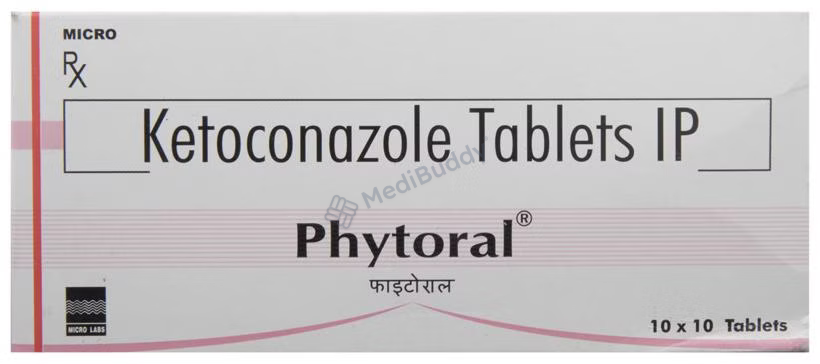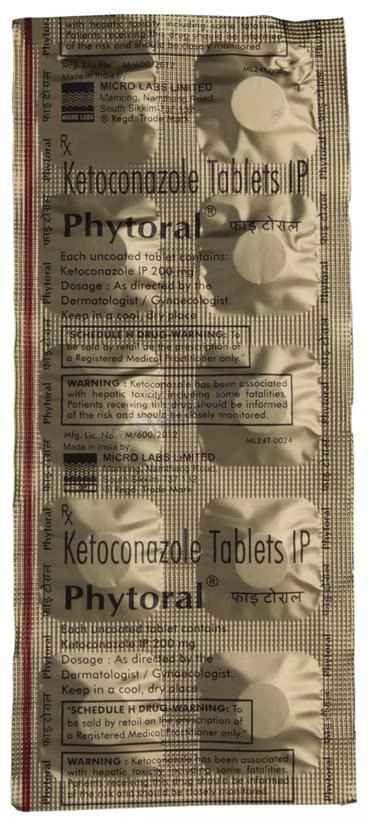Phytoral Tablet
By Phytoral
Rx
10 Tablet in a Strip

Composition
Ketoconazole(200mg)

Manufacturer - Micro Labs Ltd
27, RACE COURSE ROAD, BANGALORE-560 001, INDIA

Expires on or after
March, 2028
About Phytoral Tablet
Phytoral Tablet, containing Ketoconazole, is classified as an antifungal medication capable of inhibiting the growth of fungus in the body. This medicine is commonly prescribed for treating various infections that affect areas such as the mouth, throat, vagina, fingernails, and toenails. Its mechanism of action involves destroying the membrane of fungal cells, ultimately leading to the eradication of the fungi.
To ensure the effectiveness of Phytoral Tablet, it is essential to adhere strictly to the dosage and duration as directed by your healthcare provider. The tablets should be taken whole with a meal. The prescribed dosage and duration of treatment may vary depending on the specific condition being addressed, and there may be cycles of use and non-use involved. Consistency in taking the medication at evenly spaced intervals is crucial for optimal results. Completion of the full prescription is important, even if symptoms improve before the course ends, as premature discontinuation may result in the recurrence of the infection.
Despite its benefits, Phytoral Tablet may cause certain side effects, such as stomach pain, headache, nausea, and abnormalities in liver function. While these side effects are typically mild, it is advisable to seek medical attention if you suspect a severe allergic reaction. Signs of a severe reaction may include rash, swelling of the lips, throat, or face, difficulty in swallowing or breathing, dizziness, faintness, or persistent nausea. Prompt medical intervention is necessary in such cases.
Prior to commencing treatment with Phytoral Tablet, it is important to inform your doctor about any pre-existing conditions, especially liver, heart, or adrenal issues. The use of this medication during pregnancy should be weighed carefully against potential risks to the baby, and it is not recommended for breastfeeding women. Additionally, children, particularly those under the age of 2, are advised against using Phytoral Tablet, hence consulting a healthcare professional is necessary for suitable recommendations.
In conclusion, Phytoral Tablet offers an effective solution for combating fungal infections, with proper adherence to dosage, duration, and necessary precautions ensuring safe and successful treatment.
Benefits
Phytoral Tablet is an effective antifungal medication that is specifically designed to combat fungal infections within the body. This medication works by targeting and eliminating the fungus responsible for the infection while also halting its growth. By doing so, Phytoral Tablet helps in treating a variety of fungal infections affecting areas such as the mouth, throat, vagina, and other bodily parts. It is important to adhere to the prescribed dose and duration of treatment as directed by your healthcare provider. Completing the entire course of treatment is crucial in ensuring the complete eradication of the infection and reducing the likelihood of its recurrence. By following the recommended treatment regimen, Phytoral Tablet can effectively clear the infection and promote overall health and well-being.
Uses of Phytoral Tablet
Phytoral Tablet is commonly used in the treatment of fungal infections. Fungal infections can affect different parts of the body, such as the skin, nails, and mucous membranes. The active ingredient in Phytoral Tablet, which is ketoconazole, works by stopping the growth of fungi that cause these infections. It is effective in treating a variety of fungal infections and helps in relieving symptoms like itching, redness, and discomfort. Remember to take this medication as prescribed by your healthcare provider to ensure the best results.
What conditions Phytoral Tablet treats?
Phytoral Tablet is used to treat fungal infections by stopping the growth of the fungus causing the infection. It can help with infections in the mouth, throat, vagina, as well as other body parts like fingernails and toenails. The medicine should be taken as prescribed by your doctor, usually with food. Completing the full course of treatment is essential to fully cure the infection and prevent it from coming back. It is important to follow your doctor's instructions carefully to ensure the best results.
Should you consult a doctor?
If you experience severe allergic reactions like rash, swelling of lips, throat, or face, along with difficulty in swallowing or breathing, dizziness, faintness, or severe nausea, seek immediate medical help. Additionally, inform your doctor if the infection does not improve or worsens.
Consult your healthcare provider before taking Phytoral Tablet if you have a history of heart failure, weakened immune system, liver issues, or are pregnant. Seek medical advice if you notice persistent side effects like nausea, vomiting, abdominal pain, itching, diarrhea, or abnormal liver function.
Furthermore, for treatment exceeding one month, your doctor may recommend monitoring your liver through blood tests due to potential effects on liver function. If you experience dizziness or blurred vision, refrain from driving or using machinery until you are safe to do so.
Side effects of Phytoral Tablet
When taking Phytoral Tablet, some individuals may experience certain side effects. These effects are usually mild and transient, resolving as the body adapts to the medicine. However, it's important to be aware of them and consult your doctor if they persist or cause concern. Common side effects include nausea, vomiting, abdominal pain, itching, diarrhea, and abnormal liver function tests. If you experience any of these symptoms, it is advisable to seek medical advice to determine the best course of action.
Safety advice

liver
It is important to be cautious when using Phytoral Tablet in patients with liver disease. Adjusting the dose of the tablet may be necessary in such cases, so it is advised to consult your doctor before taking Phytoral Tablet if you have any liver issues.

kidney
Phytoral Tablet needs caution in severe kidney disease. Adjusting the dose may be necessary. Always consult your doctor for guidance.

alcohol
It is unsafe to consume alcohol with Phytoral Tablet.

driving
Phytoral Tablet can reduce alertness, cause vision changes, or drowsiness. Avoid driving if you experience these effects.

pregnancy
Phytoral Tablet may not be safe to use during pregnancy. Animal studies suggest potential harm to the developing baby. Your doctor will assess the risks and benefits before prescribing. Please consult your doctor for guidance.

breastfeeding
Phytoral Tablet is considered unsafe during breastfeeding as it may pass into breastmilk and harm the baby, based on limited human data.
Consumption warning before consuming Phytoral Tablet
Before taking Phytoral Tablet, it is important to note a few key points for your safety and effectiveness of treatment. This antifungal medication should only be taken as prescribed by your doctor, in the specified dose and timeframe. Swallow the tablet whole with food. Treatment duration varies depending on the condition, and it is crucial to complete the full course, even if symptoms improve. Missing doses may lead to resistant infections or a return of the original infection. Common side effects like stomach pain and headache are usually mild, but severe allergic reactions require immediate medical attention. Refrain from taking antacids close to ingestion of the tablet. Avoid using if pregnant unless advised by a doctor and consult if you've had heart failure, immune system issues, or liver problems. Regular liver function tests may be necessary for long-term use. Lastly, be cautious as the medication can cause dizziness or blurred vision, so refrain from driving or operating machinery until you are sure of its effects.
Life threats
Alestol 10mg Tablet
Astelong 10mg Tablet
Astem 10mg Tablet
Astelong 5mg Oral Suspension
Acemiz Plus 5mg Suspension
Stemiz 5mg Suspension
Alerzole 10mg Tablet
Stemiz 10mg Tablet
Acipax 10mg Tablet
Regubeat 100mg Tablet
Related lab tests
For individuals using Phytoral Tablet, certain related lab tests can be helpful in monitoring their health and treatment progress. One important test is a culture to identify any fungus present in the body. This test helps in diagnosing fungal infections and determining the specific type of fungus causing the issue. By conducting a fungus culture, healthcare providers can make informed decisions about the most effective treatment approach for the patient. It is essential to periodically monitor fungal infections, especially for individuals taking Phytoral Tablet, to ensure timely and appropriate management of any potential issues.
Related Lab Tests:
1. Fungus Culture
Additional Information
| Habit Forming | No |
| Chemical Class | Azole derivatives |
| Therapeutic Class | OPHTHAL OTOLOGICALS |
| Action Class | - |
FAQs
Disclaimer
The information provided on this website is to the best of our abilities to ensure it is accurate, reliable, and reviewed by a team of professionals. It should not be used to diagnose, prevent, or cure any health problem. The information presented here is not intended to create a doctor-patient relationship or replace a registered medical practitioner's advice, diagnosis, or treatment. The absence or provision of any information or warning regarding any medicine should not be assumed as an implied or explicit assurance of safety or efficacy. We highly recommend consulting your registered medical practitioner for all queries or doubts related to your medical condition. Do not ignore professional medical advice or delay seeking it based on the content encountered on our website. We intend to support, not replace, the doctor-patient relationship.
₹460.8
₹512
10% OFF
Inclusive of all taxes
Content verified by

Dr. Gowri Kulkarni
MBBS - General Medicine, DNB - Psychiatry, MRCGP [INT] Family Medicine, BSIC (BACP)
Last update on 27-Sep-2024










